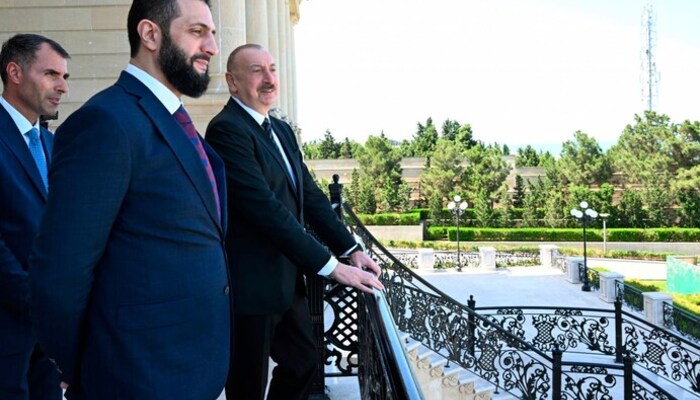BAKU / DAMASCUS — A Syrian and an Israeli official are expected to meet later Saturday in Azerbaijan’s capital, Baku, marking a rare diplomatic moment between two longtime adversaries, according to a diplomatic source in Damascus familiar with the matter.
The meeting will reportedly take place on the sidelines of Syrian President Ahmed al-Sharaa’s official visit to Azerbaijan, though the president himself will not attend. The discussions will primarily focus on Israel’s expanding military activity inside Syrian territory, a matter that has heightened regional tensions since the fall of Bashar al-Assad’s regime in December.
Sharaa’s Baku Visit Signals Strategic Shift
Syrian President Sharaa’s presence in Baku suggests a widening of Syria’s foreign engagement, especially as it navigates a new political reality post-Assad. While Syria and Azerbaijan have maintained limited ties in the past, today’s meeting could mark a turning point.
According to Azerbaijani officials, President Sharaa will meet President Ilham Aliyev to finalize a new gas export agreement, in which Azerbaijan will begin supplying natural gas to Syria via Turkiye. This deal is expected to boost Syria’s fragile economy and marks a symbolic move of regional integration.
Yet it is the indirect Syrian-Israeli contact that is drawing global attention, especially given Israel’s deep military involvement in Syria over the past decade.
Israel Maintains Strong Presence in Caucasus
Israel’s diplomatic and defense ties with Azerbaijan are long-established. The country is a major arms supplier to Baku and maintains a strong intelligence footprint in the region, primarily due to Azerbaijan’s strategic proximity to Iran, Israel’s regional rival.
This close relationship has made Azerbaijan a neutral venue for secretive diplomatic activity. A Damascus-based diplomat told Day News TV that Baku was chosen precisely because of its strategic ties with both Israel and Syria, even if those ties are discreet.
“The talks won’t be public. They are exploratory and focused on military de-escalation,” the source said, requesting anonymity.
Israeli Strikes and Syria’s Golan Dilemma
Following the overthrow of Bashar al-Assad, Israel intensified its air campaign across Syria, targeting weapons depots, air defense systems, and Iranian-linked militias. It also sent troops into the Golan Heights buffer zone, previously monitored by UN forces under the 1974 disengagement agreement.
Sharaa’s interim government has urged international bodies to restrain Israel, stating that it seeks no conflict. Yet the Israeli Defense Forces (IDF) continue their operations, claiming they are preventing arms from reaching extremist factions.
Recently, Syria admitted to indirect talks with Israel regarding a return to the disengagement lines. While Tel Aviv remains skeptical of Sharaa’s leadership due to his past affiliations with radical groups, recent signals from Israeli officials hint at diplomatic openness.
Prospects for Normalisation Still Uncertain
In late June, Israeli Foreign Minister Gideon Saar said publicly that Israel would welcome normalization with Syria, mirroring earlier accords signed with several Arab states under the Abraham Accords.
However, a Syrian government source called such talk “premature,” citing internal political challenges and deep mistrust.
US Special Envoy to Syria Tom Barrack, during a visit to Lebanon this week, told reporters: “The dialogue has started between Syria and Israel.” His comments were seen as Washington’s attempt to encourage further regional thaw.
US President Donald Trump, who met with Sharaa in Riyadh in May, claimed the Syrian president showed interest in joining the Arab-Israeli normalisation wave. “He said yes. But they have a lot of work to do,” Trump remarked at the time.
What’s at Stake in Baku?
The Baku meeting may not result in any breakthrough or formal statement, but the very fact that Israeli and Syrian officials are talking at all marks a significant diplomatic development in a region long marred by hostility.
While neither side has publicly acknowledged the meeting, regional analysts believe the talks could pave the way for future security understandings, especially around the volatile Golan Heights.
With energy deals on the table, Western support nudging both sides, and Israel signaling interest in diplomatic paths, this quiet meeting in Baku might just be the beginning of a larger shift in Middle East diplomacy — though mistrust and military tensions remain major obstacles.
Follow us on Instagram, YouTube, Facebook,, X and TikTok for latest updates
